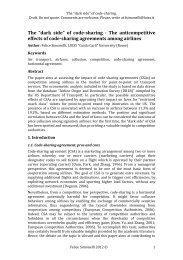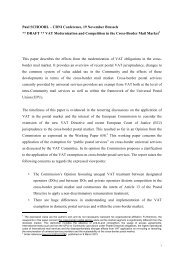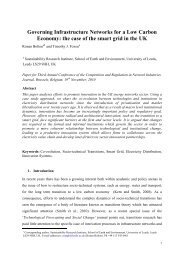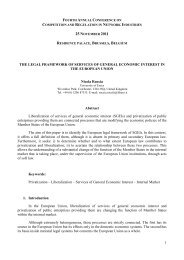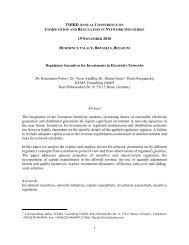Non-discriminatory Third Party Access to the Gas Transmission ...
Non-discriminatory Third Party Access to the Gas Transmission ...
Non-discriminatory Third Party Access to the Gas Transmission ...
You also want an ePaper? Increase the reach of your titles
YUMPU automatically turns print PDFs into web optimized ePapers that Google loves.
discrimination TPA. If <strong>the</strong>re are relevant differences between system users in this sense, <strong>the</strong><br />
system users require different handling by <strong>the</strong> TSO. This requires a comparison of <strong>the</strong> system<br />
users, taking <strong>the</strong>ir relevant characteristics in<strong>to</strong> account. The issue of comparability of system<br />
users acquires particular importance in cases in which <strong>the</strong>re are no grounds for justification of<br />
different treatment, because in those cases only <strong>the</strong> argument of non-comparability presents any<br />
possibility <strong>to</strong> avoid a finding in which different treatment constitutes discrimination. 91<br />
The question is whe<strong>the</strong>r all system users of <strong>the</strong> transmission system must be treated as one group<br />
<strong>to</strong> avoid violation of <strong>the</strong> non-<strong>discrimina<strong>to</strong>ry</strong> TPA principle or whe<strong>the</strong>r <strong>the</strong> system users can<br />
possibly be divided in<strong>to</strong> more groups. The TGD and <strong>the</strong> SGR do not provide a clear answer <strong>to</strong> <strong>the</strong><br />
previous questions. The TGD does, however, state that TSOs must refrain from discriminating<br />
amongst system users or classes of system users, particularly in favour of <strong>the</strong>ir related<br />
undertakings. 92 The part ‘classes of system users’ leaves room for TSOs <strong>to</strong> divide system users in<br />
different groups. This possibility is confirmed in a communication from <strong>the</strong> Commission 93 : ‘Such<br />
rates may be divided in<strong>to</strong> objective classes of cus<strong>to</strong>mers, providing that this does not result in<br />
discrimination.’ Never<strong>the</strong>less, whe<strong>the</strong>r or not TSOs have <strong>the</strong> possibility <strong>to</strong> divide system users in<br />
different groups depends on how national law transposes this possibility. As mentioned above,<br />
you cannot tar everyone with <strong>the</strong> same brush. If <strong>the</strong>re are relevant differences between system<br />
users, <strong>the</strong>y require different handling. This paper does not seek after what all relevant differences<br />
between system users can be in order <strong>to</strong> nail down when system users require equal or different<br />
handling. It does, however, seek after one characteristic of system users, namely <strong>the</strong>ir<br />
creditworthiness. Perhaps that creditworthiness of system users is a relevant characteristic a TSO<br />
can take in<strong>to</strong> account in determining whe<strong>the</strong>r system users/network users are similar or not and,<br />
thus, should be treated equally or not. This will be fur<strong>the</strong>r examined in paragraph 7.<br />
§6.2 When is different treatment of similar system users justified<br />
91 Ibid.<br />
92 Article 13 Directive 2009/73/EC.<br />
93 EUROPEAN COMMISSION (2001) Completing <strong>the</strong> internal energy market: Communication from <strong>the</strong> European<br />
Commission <strong>to</strong> <strong>the</strong> Council and <strong>the</strong> European Parliament (COM (2001) 125 final). Brussels.<br />
18



